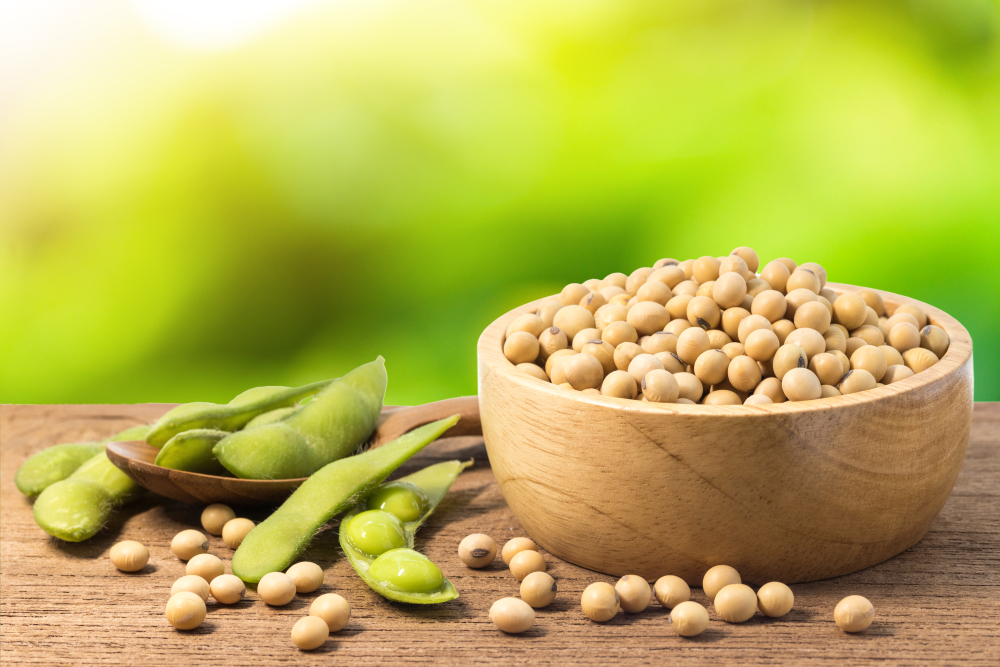Original Article: https://www.dogster.com/lifestyle/can-dogs-eat-soy
Click to Skip Ahead
Soy has gotten a bad reputation for being a cheap filler without any nutritional value. However, this isn’t always true. Soy can be a nutritious ingredient in dog food and can even be therapeutic for some health conditions. While many people believe it can cause food allergies in pups, soy is actually often a main ingredient in hypoallergenic pet foods.
So, can dogs eat soy? Absolutely, they can, but it may not be suitable for all pups. Read on to learn more.


What Is Soy?
Soy is a popular Asian legume, high in protein, fiber, iron, and folate.
The soy present in dog food needs to be in a form that is easy to digest and beneficial for their health.
- Soy protein concentrate (SPC): This is about 70% crude protein. It is defatted soybean flour that has most of the carbohydrate content removed. This isolates the protein, making it nutrient-dense and highly digestible.
- Soy protein isolate (SPI): This is about 90% crude protein, and contains no carbohydrates or fiber. It is the most concentrated source of soy protein, and is highly digestible.
- Soybean meal: These are defatted soybean flakes used as a source of protein and energy. It contains a high amount of oligosaccharides, a carbohydrate that’s not digestible by dogs and can cause a lot of gas.
- Soybean oil: This can be a great source of omega fatty acids, including omega-3s and omega-6s.
SPC and SPI are more purified than soybean meal, and are thus more expensive. For this reason, they tend to be used less often in pet foods.

Can Dogs Eat Soy?
Studies suggest that soy proteins can provide a nutritionally balanced dog food diet so long as they are formulated with other plant and animal proteins to optimize amino acid intake.1


Benefits of Soy for Dogs
1. Helps With Allergies
Despite the common belief that soy exacerbates food allergies, hydrolyzed soy can actually be beneficial for pups with food allergies. Some veterinarians actually prescribe dogs a diet with hydrolyzed soy when diagnosing and treating allergies because the proteins contained in this type of diet are broken into small pieces that essentially “sneak through” a dog’s digestive system without the immune system recognizing them and causing an allergic reaction. Of course, there may still be dogs that are allergic to soy, but this tends to happen less frequently than allergies to other ingredients such as chicken or beef.
2. Amino Acids
From a nutritional standpoint, soy can offer dogs a great source of digestible amino acids as it contains nine of the 10 essential aminos dogs require in a healthy diet. It’s especially high in lysine, which supports healthy growth and development.

3. Protein & Antioxidant Content
Many dog foods contain soy as one of their primary protein sources as it’s much cheaper than animal proteins.
Soy contains natural compounds known as isoflavones. Studies suggest that diets with these can have positive effects on metabolism and weight management. Isoflavones may reduce weight gain in spayed and neutered dogs by increasing their energy expenditure. Isoflavones may also have some antioxidant capabilities.
4. Fiber & Vitamin Content
Soy is an excellent source of fiber, which can promote digestive health and promote regularity with bowel movements. It also contains numerous vitamins and minerals, including vitamin B6, which is involved in amino acid metabolism, and potassium, which plays many essential roles in the body, like transmitting nerve impulses.
5. May Assist With Disease Management
Veterinarians will sometimes prescribe soy-based foods for dogs with certain medical conditions, such as certain types of bladder stones. Dogs that are predisposed to urate stones may not be able to break down uric acid as they should and may need to eat a low-purine diet to prevent stones from forming in the future. As with many plant proteins, soy is lower in purine than animal proteins and may be able to prevent recurrences.
Additionally, vets may recommend that dogs with liver disease eat soy-based diets as they may be able to reduce the workload on the liver.



Concerns Over Soy for Dogs
Of course, as with all controversial ingredients, there are some health concerns about feeding soy to dogs.
Allergies
Soy allergies are less common in dogs than you might think. Studies suggest that the most frequently reported food allergens for pups were beef, dairy products, chicken, wheat, and lamb. However, just because it isn’t as common doesn’t mean that dogs can’t be allergic to soy. This is why it’s important to introduce any new food or ingredient slowly and transition your pup from their old food to new food over the course of a few days or weeks so you can monitor for adverse reactions.


Flatulence
Soybean meal, in particular, can contain compounds that may cause flatulence in dogs. If your dog already has gastrointestinal issues, you may want to bypass foods that contain a lot of soybean meal in case they further exacerbate their tummy problems.


Final Thoughts
Though soy has gotten a bad reputation in the pet food world, when it is included in proper amounts in a nutritionally sound, complete, and balanced dog food, it can provide a great source of protein and other nutrients.
Soy allergies in dogs are relatively rare, at least in comparison to other allergens, though that doesn’t mean it won’t cause an allergic reaction. Like all new foods, it’s essential to introduce a soy-inclusive diet slowly and follow a proper transitionary schedule as recommended by your veterinarian.
Featured Image Credit: LookerStudio, Shutterstock
Source: Dogster












